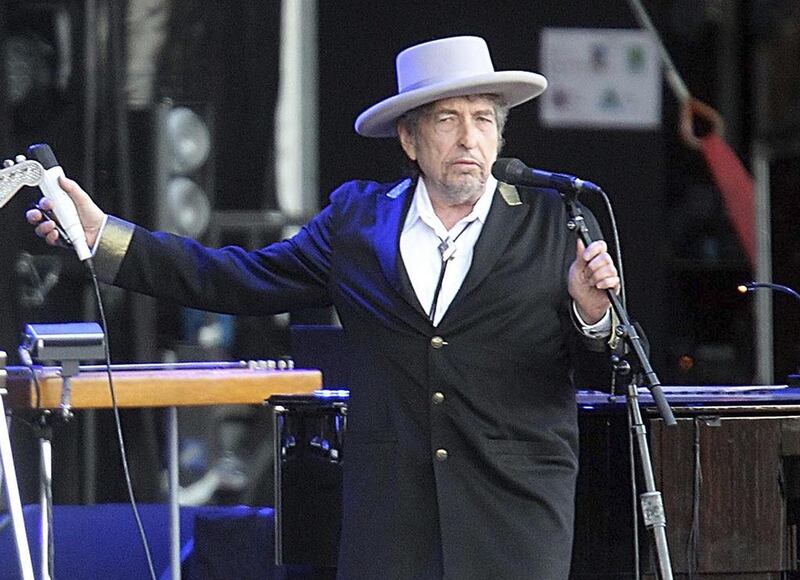If Bob Dylan was going to win a Nobel prize, there was a time when you would have bet on it being for peace, not literature. In the early 1960s, the American poet-musician wrote about social injustice and nuclear threat, and campaigned for civil rights. One of his highest profile public appearances ever was at the August 1963 March on Washington where Dr Martin Luther King Jr delivered his “I have a dream...” speech.
As influential as Dylan was in this capacity, writing music that championed the oppressed and hoped for change – his songs became banners for his generation to march under – to be a writer of protest songs was clearly too limiting an occupation for him.
To be defined, to judge by his subsequent artistry, is, in Dylan’s estimation, to be captured.
Nonetheless, on some level, he clearly enjoys commemoration.
Rather than refusing awards on principle, he will accept recognition from the establishment he has spent his life shunning, if only to publicly show his disdain.
When Princeton University tried to award him an honorary degree in 1970, he attended, but officials must have wondered why.
He held up proceedings refusing to wear the required ceremonial robes and then wrote an extremely bitter song about it called Day of the Locusts.
By the time he received the Presidential Medal of Freedom from Barack Obama in 2012, he confined his objection to an inscrutable smile and his sartorial refusal to take his sunglasses off.
It’s as if his public attitude is to say, “Sure, you can throw me a party. Just don’t expect me to enjoy it.”
You won’t find anyone saying so, but it is probably this mercurial nature that is being honoured in awarding Dylan the Nobel Prize for Literature – the first time it’s been bestowed on a musician for “having created new poetic expressions within the great American song tradition”, as the Swedish Academy noted in Thursday’s announcement.
Clearly, you can talk about his songs in terms of literature (as academics like Christopher Ricks, currently trending on Twitter, famously have).
There have also been published works outside the songs (like Tarantula, an experimental novel or an idiosyncratic non-linear memoir, Chronicles), but it is not really these which are being honoured here either.
Nor, oddly, is the award for specific songs, like, say the surreal genius of Subterranean Homesick Blues or The Lonesome Death of Hattie Carroll – in which a song assumes the meticulous reporting of a newspaper article.
Rather, it’s for an entire mode of artistic conduct: an ongoing change, a ceaseless dissatisfaction with staying in one place.
Ukrainian writer Svetlana Alexievich, who won the award last year, did so for work which, the committee said, “deepens our comprehension of an entire era”.
The same might be said of Dylan’s work – additionally noting that his work, reaching millions, actually helped change his era and direct its concerns, as well as provide a soundtrack to its experiences.
Of course, this kind of discussion and supposition is what prize committees enjoy most.
Beyond the concern to behave responsibly, honour the traditions of the founders and so forth, there is in every judging panel the wish to throw a curveball once in a while. It could be an urge to modernise, or to gain more widespread awareness of their work – in which case, you’d have to say congratulations are very much in order here.
You might even like to imagine that since the artist’s nomination in 2011, the committee has been inspired to its own Dylanesque behaviour.
Maybe more importantly, beyond the issue of literary merit, making this award to Bob Dylan raises a wider philosophical question – how do you effectively commemorate those of Dylan’s generation, or anyone’s, whose influence is enormous but whose stance has historically been anti-establishment? Their contribution, after all, has been to stand outside throwing rocks.
Why would anyone want to invite them in to sit at the table?
The hip, suspicious, 23 year-old Dylan might have raised an eyebrow and wondered out loud – what’s in it for them, exactly?
Some prize-worthy lyric highlights:
“Come gather ’round people
Wherever you roam
And admit that the waters
Around you have grown”
The Times They Are A Changin’ (1963)
“Never sat once at the head of the table
And didn’t even talk to the people at the table
Who just cleaned up all the food from the table
And emptied the ashtrays on a whole other level”
The Lonesome Death of Hattie Carroll (1963)
“Johnny’s in the basement
Mixing up the medicine
I’m on the pavement
Thinking about the government
The man in the trench coat
Badge out, laid off
Says he’s got a bad cough
Wants to get it paid off”
Subterranean Homesick Blues (1965)
“I ain’t looking for nothing in anyone’s eyes
Sometimes my burden seems more than I can bear
It’s not dark yet, but it’s getting there”
Not Dark Yet (1997)
newsdesk@thenational.ae





